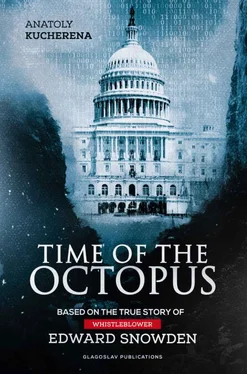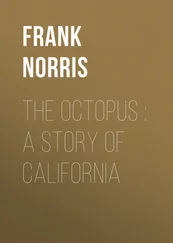Anatoly Kucherena
TIME OF THE OCTOPUS
BASED ON THE TRUE STORY OF WHISTLEBLOWER EDWARD SNOWDEN
…May they be damned, these interests of civilization; and may civilization itself be damned if its preservation demands the stripping of skin from living people.
Fyodor Dostoevsky
Those who would give up essential Liberty to purchase a little temporary Safety, deserve neither Liberty nor Safety.
Benjamin Franklin
Water is fluid, soft, and yielding. But water will wear away rock, which is rigid and cannot yield. As a rule, whatever is fluid, soft and yielding will overcome whatever is rigid and hard. This is another paradox: what is soft is strong.
Lao Tzu
The heresy of heresies was common sense. And what was terrifying was not that they would kill you for thinking otherwise, but that they might be right.
For, after all, how do we know that two and two make four? Or that the force of gravity works? Or that the past is unchangeable? If both the past and the external world exist only in the mind, and if the mind itself is controllable – what then?
George Orwell
The plot and main characters of this story are a figment of the imagination of the author and any correspondence with real people and events is purely coincidental.
The transit area of any international airport is in some ways a kind of beached Noah’s Ark. It is not floating off anywhere. It is not threatened by the rising tide of the next flood. Yet it provides a lifeboat for those who have something to be afraid of in this life of misery and hardship.
Ordinary passengers burdened merely by daily cares, baggage, children, domestic problems and lack of time shoot through transit areas like shoals migrating from one shore of the boundless ocean of air to another. They barely notice those who linger longer here.
The more persistent inhabitants of the transit area – often conforming to the biblical ‘two of every living creature under the sun’ – try to stay unnoticed, keeping away from the well-trod passenger tracks, slipping away unobtrusively into the back alleys and hidden habitable cul-de-sacs of the airport terminal. For those with means, there are, of course, mini-hotels in transit areas, but the cost is way above the ordinary lingerer’s budget.
Yes, they are a varied and numerous community, this tribe of transit area dwellers! There are migrants who, by hook or by crook, made it aboard a plane to escape from poor countries that are not even Third World, but fourth or fifth, in the hope of reaching somewhere they might be accepted as refugees. There are young travellers, who move almost like hitchhikers, without visas and permits. There are old hippies, the last outgrowth of the flower children, on the way to eternal Katmandu. There are shady characters, too – characters on the prohibited lists of different states, defaulters on credits, protestors, false witnesses, deserters, heroes of criminal and political cases; ideological fighters against borders, anarchists, extremists and radicals of all stripes, prophets and false prophets, and also the clinically insane, which may not be so different. And then there are the unfortunates who have simply lost tickets and documents.
All these people are waiting for something. Some are waiting for a decision from the authorities, some for money to be transferred from relatives or acquaintances, and others just for documents, objects, or traveling companions… But there are also those for whom a transit area is the only place on planet Earth where they can feel free.
SHEREMETYEVO INTERNATIONAL AIRPORT, 07:10 P.M._
Among the transit tribe at Moscow’s Sheremetyevo was the young American Joshua Kold – international celebrity, headline newsmaker and also, according to Washington officials, wanted criminal. In the more benevolent English-language media he was referred to as a ‘whistleblower’. This means literally ‘one who blows a whistle,’ of course, but in the USA and other countries the term applies to people who make confidential information public to reveal what they see as violations of laws and ethical standards in their place of work.
To cut a long story short, the concatenation of circumstances conspired in such a way that the transit area of Sheremetyevo Airport became the only place where Joshua Kold could feel relatively safe.
Just what Kold had done to bring him here was little understood by many – even the President of Russia publicly called him ‘a strange guy.’ But there was no doubt that his revelations had caused a sensation and, in some media outlets, the Kold affair was already described as ‘the juiciest spy scandal of all time.’
There is one obvious problem with this nonsense – Joshua Kold’s offence was not actually spying…
A spy is someone who works to obtain secrets on behalf of a political system, a state, a group of citizens, or even a religious sect. There are deadly risks of being found out, of course, but this fascinating activity always brings a reward – a remuneration in some form from those the spy serves.
The infamous Aldrich Ames (Aldrich Ames was the CIA analyst turned KGB mole who compromised more American agents than almost any other CIA mole. He was convicted in 1994 and is now serving a life sentence), for instance, was said to have sold the identity of his colleagues and numerous CIA agents to the Soviet intelligence services in exchange for a new house and fancy Jaguar. But there are exceptions.
Dmitry Polyakov, a general in GRU (Main Intelligence Directorate), was slipping confidential information to the American side for ‘ideological reasons’ for 25 years – or at least that’s what he said during interrogations in ‘the cellars of Lubyanka’. Whatever the truth, there was a hostile Soviet system against him, and it was no accident that the brilliant winner in the Cold War Ronald Reagan asked Soviet leader Mikhail Gorbachev to pardon him – but the request came a little late (General Dmitry Polyakov passed on Soviet secrets for 25 years to the USA where he was known as ‘Top Hat’ by the FBI and ‘Bourbon’ by the CIA. His cover was blown in 1987 by Aldrich Ames and others, and he was executed in 1988. CIA officer Jeanne Vertefeuille said of him, “He didn’t do this for money. He insisted on staying in place to help us. It was a bad day for us when we lost him.”).
What Kold did, in his own way, was to show the world a unique example of the loner hero.
At least, that’s how it looked on the surface. The young man with densely compressed lips and a steely gaze had thrown out a challenge to the mightiest power in the world. A plot like this would be a complete no-no in Hollywood, where the screwed up loner would always be defeated by the anti-hero. In American blockbusters, there is almost never a speech about a fight against the system. Kold threatened the system – and so became a target.
Somehow, he had managed to slip away right under the nose of the countersurveillance department of the National Security Agency and get out of the USA. Beyond that, everything was obscured by a fog of uncertainty. All the same, enough information had filtered through the haze to propel hundreds of journalists to the transit area of Sheremetyevo International Airport in hope of finding the star fugitive.
The fact that Kold had become a star didn’t seem to raise doubts for anyone. It was a simple narrative. He had not just tapped on the beak of the American eagle; he had given it thorough, and very humiliating, kick – as if it was not an awesome feathered predator but a feeble country chicken chaotically trying to evade a bike rider.
Читать дальше












